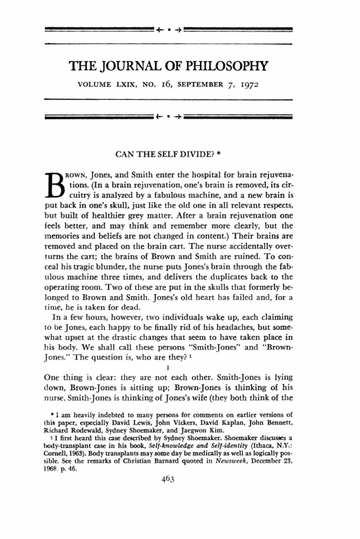Extract from that essay:
"But suppose, we might say, we strip away the details of my body and my life and pare me down to the essential nub of experiencing entity. What makes this nub any different from other such nubs, and why is it linked with the life of this particular human organism rather than any other?
Some would say in response that there is no such nub; it’s exactly my history and my physical constitution that make my consciousness what it is; so again it’s no surprise, properly understood, that my experiences belong to me and not to anyone else. Strip away all those supposedly inessential features, and you strip me away with them. Others would accept that it’s my history and composition that define me as me, but feel, possibly on the basis of introspection, that there still is something to me over and above all that. They might find this final ingredient in an inscrutable panpsychic quality of matter itself; others have suggested a kind of universal experiential substrate or background. Instead of individual nubs, we have a kind of Universal self; a line of thought which is highly compatible with some religious and mystical views.
However, I think both sides of this argument are missing the point. To say that my individual consciousness arises from or is constituted by my physical nature and background is not actually to dispose of the essential problem at all, because my physical nature and background are also inexplicably particular. Perhaps the underlying problem is the vexed question of why anything is anything in particular: it’s just that in the case of my own experience and my own existence the question hits me with a force it lacks when I’m merely wondering about a chair. The basic problem is haecceity or thisness (the same problem which in my view lies at the root of the qualia problem)."
I like this subsequent comment by 'Chris':
"9. Chris says:
It seems to me one of the big problems is the insistence of people on fitting all phenomena into a material/physical model of the universe, but such is the mindset of the current day. The existence of qualia and the Hard Problem are proof positive that there is another basic mode of existence/understanding aside from reductionary logic/physics. Not proof in the logical sense of the term that we are used to, but proof in an empirical sense – and when it comes down to it, the subjective mode of knowledge which is represented by qualia is really the only one we actually have direct access to, since the objective rational mode of knowledge has to be filtered through this subjective layer before it can be experienced by the human mind (as Kant has exhaustively discussed). I propose that mankind really needs another basic way of understanding things – another fundamental theory of knowledge that would be just as enormously impactful as the rise of scientific thought was during the Renaissance – a theory of the subjective. Because it is fundamentally different, it could not be discussed rationally or logically, but it COULD be discussed empirically. That way we could have two branches of the theory of knowledge, one objective and rational, the other subjective and irrational, but both based on empiricism, which is the only tool the human mind really has to systematically gather knowledge. This would be a huge development – we need to stop trying to define the one as a product of the other – the subjective and the objective are fundamentally different and irreconcilable. Of course, they could be reconcilable at a level that transcends both, which is what many of the pure philosophical and religious propositions discussed try to do, but let’s get both the branches nailed down before we move on to the trunk."
I'm still not fully understanding the problem but according to this author it is the problem of why anything is anything and is related to the HP.
"Perhaps the underlying problem is the vexed question of why anything is anything in particular: it’s just that in the case of my own experience and my own existence the question hits me with a force it lacks when I’m merely wondering about a chair. The basic problem is haecceity or thisness (the same problem which in my view lies at the root of the qualia problem)."
It is helpful to understand the phenomenological insight that a prereflective cogito forms within and out of the temporally accruing and compounding experiences of individual living organisms and animals. "Lived experience" refers to/signifies individually sensed self-referential experiences in and of the environing 'world' by virtue of which the animal develops its grip on the immediate structuring conditions of its existence. It is the prereflective cogito that grounds and enables the development of the reflective cogito in our species (and likely some other species on this planet and elsewhere in the universe).

